Putin sets partial military call-up in Russia, makes veiled threats on nukes
MOSCOW - Russian President Vladimir Putin ordered a partial mobilization of reservists Wednesday, taking a risky and deeply unpopular step that follows humiliating setbacks for his troops nearly seven months after invading Ukraine.
The first such call-up in Russia since World War II is sure to further fuel tensions with the Western backers of Ukraine, who derided it as an act of weakness and desperation. The move also sent some Russians scrambling to buy plane tickets out of the country and reportedly sparked some demonstrations.
The Kremlin has struggled to replenish its troops in Ukraine, reaching out for volunteers. There even have been reports of widespread recruitment in prisons.
In his seven-minute nationally televised address, Putin also warned the West he isn't bluffing over using everything at his disposal to protect Russia — an apparent reference to his nuclear arsenal. He has previously told the West not to back Russia against the wall and has rebuked NATO countries for supplying weapons to Ukraine.
The total number of reservists to be called up could be as high as 300,000, officials said. However, Putin's decree authorizing the partial mobilization that took effect immediately offered few details, raising suspicions that the draft could be broadened at any moment. Notably, one clause was kept secret.
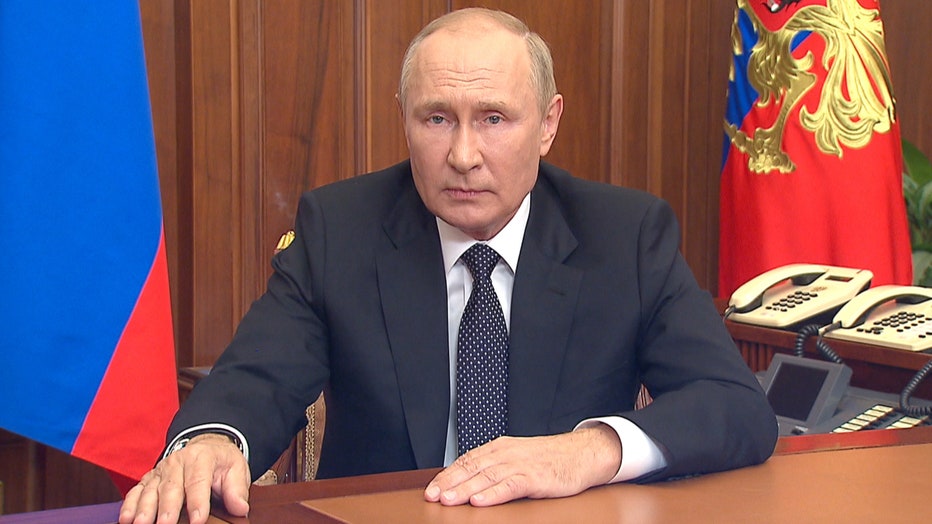
Russian President Vladimir Putin delivers a speech in televised address to nation to announce partial military mobilization in Russia, in Moscow, Russia on September 21, 2022. (Photo by Kremlin Press Office / Handout/Anadolu Agency via Getty Images)
Even a partial mobilization is likely to increase dismay or doubt among Russians about the war. Shortly after Putin’s address, Russian media reported a spike in demand for plane tickets abroad amid an apparent scramble to leave despite exorbitant prices.
The Vesna opposition movement called for nationwide protests, although it was unclear how many would act, given Russia’s harsh laws against criticizing the military and the war.
"Thousands of Russian men -- our fathers, brothers and husbands -- will be thrown into the meat grinder of the war. What will they be dying for? What will mothers and children be crying for?" the group said.
READ MORE: Biden accuses Putin of violating United Nations charter with 'brutal, needless' war
Avtozak, a Russian group that monitors protests, reported demonstrations by dozens of people in cities, including Ulan-Ude and Tomsk in Siberia, and Khabarovsk in the Far East, with some arrests.
As protest calls circulated online, the Moscow prosecutor’s office warned that organizing or participating in such actions could lead to up to 15 years in prison. Authorities issued similar warnings ahead of other protests recently. The state communication watchdog Roskomnadzor also warned media that access to their websites would be blocked for transmitting "false information" about the mobilization. It was unclear exactly what that meant.
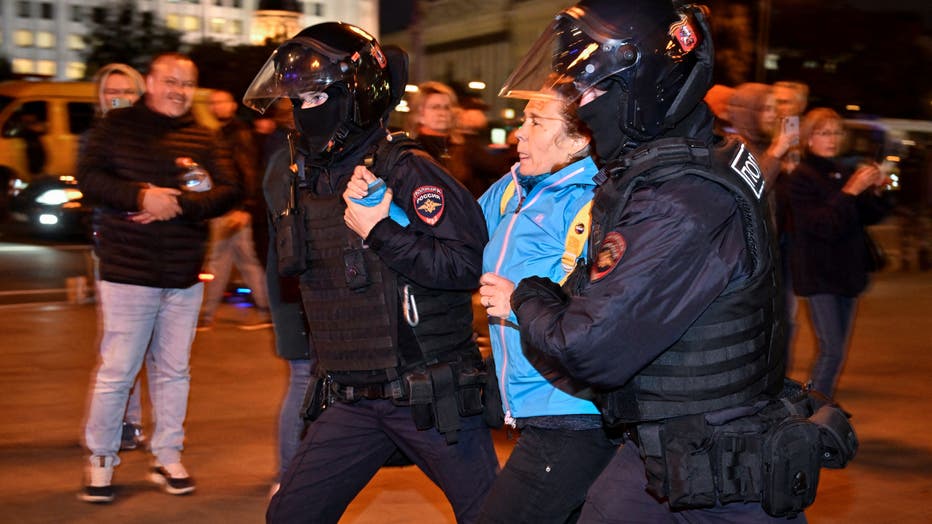
Police officers detain a woman in Moscow on September 21, 2022, following calls to protest against partial mobilisation announced by President Vladimir Putin. (Photo by ALEXANDER NEMENOV/AFP via Getty Images)
Kremlin spokesman Dmitry Peskov, asked what had changed since he and others previously said no mobilization was planned, said Russia is effectively fighting NATO because the alliance’s members have supplied weapons to Kyiv.
The partial mobilization order came a day after Russian-controlled regions in eastern and southern Ukraine announced plans for referendums on becoming integral parts of Russia — a move that could eventually allow Moscow to escalate the war. The referendums will start Friday in the Luhansk, Kherson and partly Russian-controlled Zaporizhzhia and Donetsk regions.
The balloting is all but certain to go Moscow’s way. Foreign leaders are already calling the votes illegitimate and nonbinding. Ukrainian President Volodymyr Zelenskyy said they were a "sham" and "noise" to distract the public.
U.S. national security council spokesperson John Kirby said Putin’s speech is "definitely a sign that he’s struggling, and we know that."
READ MORE: UN chief warns world is 'paralyzed,' equity slipping away at General Assembly
Added White House press secretary Karine Jean-Pierre on MSNBC: "It’s all because Russia is losing ground on the battlefield."
Kirby told ABC's "Good Morning America" that Russia has suffered tens of thousands of casualties, has command and control issues, terrible troop morale, desertion problems and is "forcing the wounded back (into) the fight."
But Russian Defense Minister Sergei Shoigu, who also spoke on Russian TV, said 5,937 Russian soldiers have died in the conflict, far lower than Western estimates.
Shoigu also said that only those with relevant combat and service experience will be mobilized, adding that about 25 million people fit this criteria but only about 1% of them will be mobilized.
Neither Shoigu nor Putin offered any other criteria for the call-up, so it wasn’t clear how many years of combat experience or what level of training those to be mobilized must have. The decree, signed by Putin and released on the Kremlin website, provided even less clarity, stipulating only that "citizens of the Russian Federation" will be drafted in the partial mobilization.
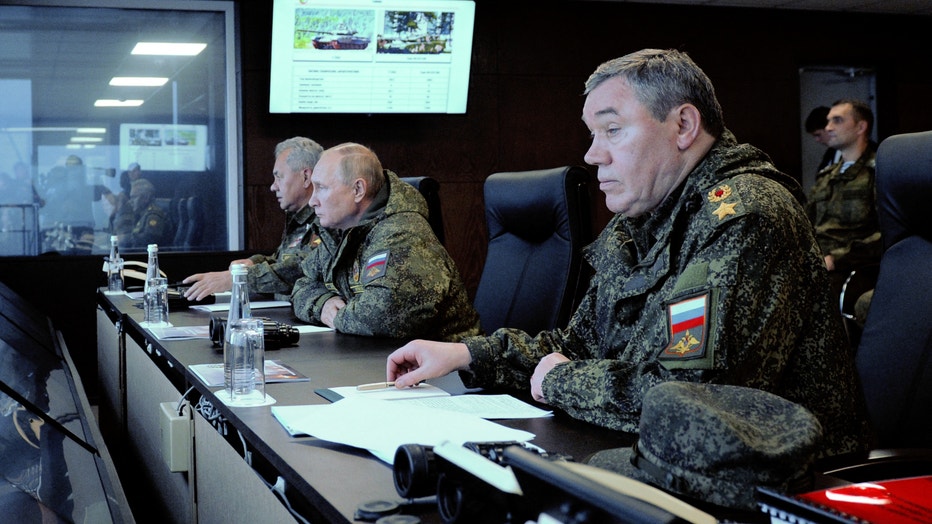
Russian President Vladimir Putin (C), accompanied by Defence Minister Sergei Shoigu (L) and Valery Gerasimov, the chief of the Russian General Staff (Photo by MIKHAIL KLIMENTYEV/SPUTNIK/AFP via Getty Images)
Another key clause in the decree prevents most professional soldiers from terminating their contracts and leaving service until the partial mobilization is no longer in place.
Russia's invasion of Ukraine has been the target of broad international criticism at the U.N. General Assembly that has kept up intense diplomatic pressure on Moscow. Zelenskyy is due to speak to the gathering in a prerecorded address later Wednesday. Putin is not attending.
U.S. President Joe Biden used the global forum to say Russia has "shamelessly violated the core tenets" of the U.N with its "brutal, needless war" in Ukraine. He said Putin’s new nuclear threats against Europe showed "reckless disregard" for Russia’s responsibilities as a signer of the Treaty on the Non-Proliferation of Nuclear Weapons.
Putin's mobilization gambit has a strong element of risk: It could backfire by making the war unpopular at home and hurting his own standing. It also concedes Russia's underlying military shortcomings.
A Ukraine counteroffensive this month has seized the military initiative from Russia, as well as capturing large areas in Ukraine that the Russians once held. Its speed saw Russian troops abandon armored vehicles and other weapons as they retreated.
READ MORE: Ukraine's Zelenskyy visits recaptured city following Russian military retreat
A spokesman for Zelenskyy called the mobilization a "big tragedy" for the Russian people.
In a statement to The Associated Press, Ukrainian presidential spokesman Sergii Nikiforov said conscripts sent to Ukraine would face the same fate as ill-prepared Russian forces who unsuccessfully tried to take Kyiv early in the war.
"This is a recognition of the incapacity of the Russian professional army, which has failed in all its tasks," Nikiforov said.
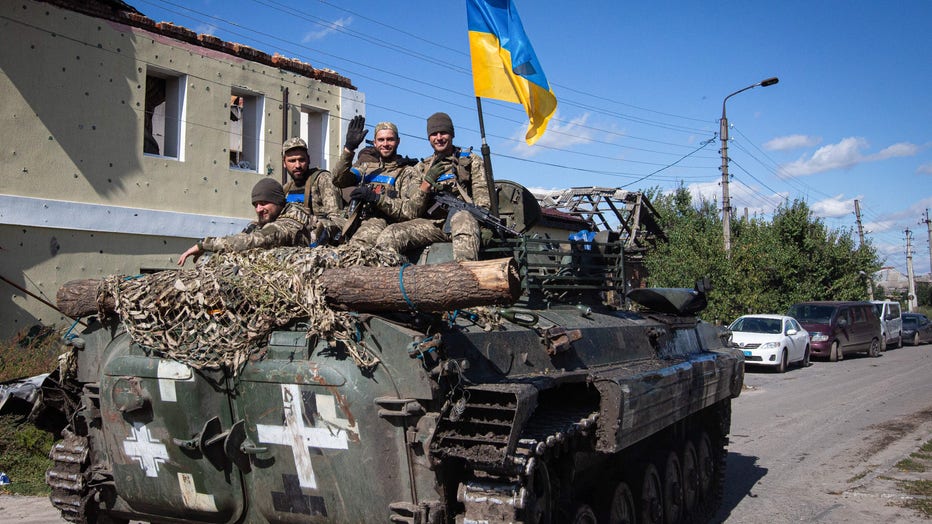
Ukrainian soldiers ride in an armored tank in the town of Izium, recently liberated by Ukrainian Armed Forces, in the Kharkiv region. Russian troops occupied the town of Izium on April 1, 2022. (Photo by Oleksii Chumachenko/SOPA Images/LightRocket vi
The Russian mobilization is unlikely to produce any consequences on the battlefield for months because of a lack of training facilities and equipment.
British Defense Secretary Ben Wallace described Putin’s move as "an admission that his invasion is failing."
Russian political analyst Dmitry Oreshkin said it seemed "an act of desperation." He predicted that Russians will resist the mobilization through "passive sabotage."
"People will evade this mobilization in every possible way, bribe their way out of this mobilization, leave the country," Oreshkin told the AP.
The announcement will be unpopular, he said, describing it as "a huge personal blow to Russian citizens, who until recently (took part in the hostilities) with pleasure, sitting on their couches, (watching) TV. And now the war has come into their home."
The war in Ukraine, which has killed thousands of people, has driven up food prices worldwide and caused energy costs to soar. It has also brought fears of a potential nuclear catastrophe at Europe’s largest nuclear plant in Ukraine’s now Russia-occupied southeast. Investigations are also underway into possible war crimes atrocities committed by Moscow's forces.
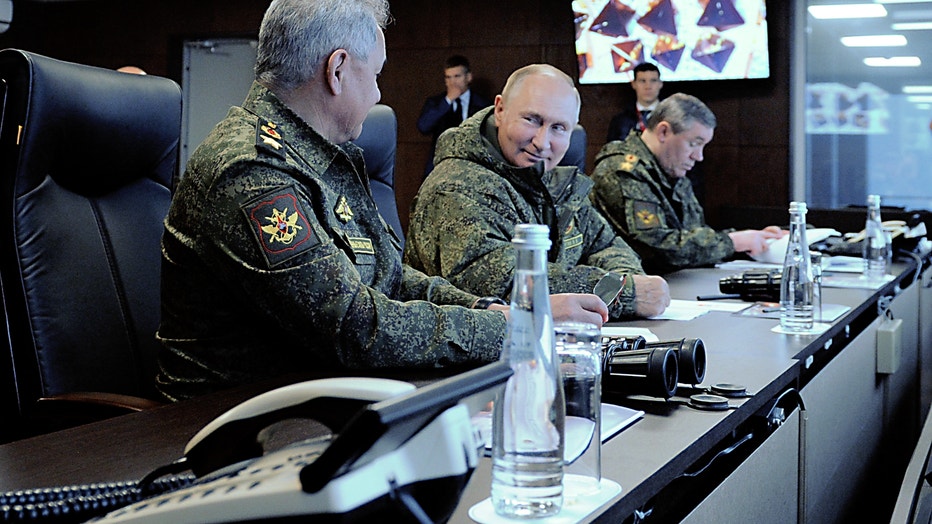
Russian President Vladimir Putin (C), accompanied by Defence Minister Sergei Shoigu (L) and Valery Gerasimov, the chief of the Russian General Staff (Photo by MIKHAIL KLIMENTYEV/SPUTNIK/AFP via Getty Images)
In his address, which was far shorter than previous speeches on the war, Putin accused the West of engaging in "nuclear blackmail" and noted "statements of some high-ranking representatives of the leading NATO states about the possibility of using nuclear weapons of mass destruction against Russia."
He didn't elaborate.
"To those who allow themselves such statements regarding Russia, I want to remind you that our country also has various means of destruction ... and when the territorial integrity of our country is threatened, to protect Russia and our people, we will certainly use all the means at our disposal," Putin said, adding: "It’s not a bluff."
In a speech hours later in Novgorod marking 1,160 years of Russian statehood, Putin hailed the "heroes" fighting in Ukraine and stressed the "colossal responsibility" of protecting the nation's sovereignty.

